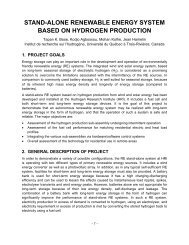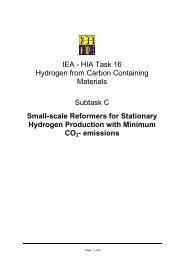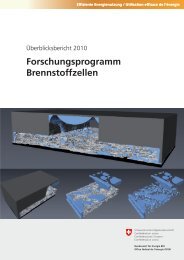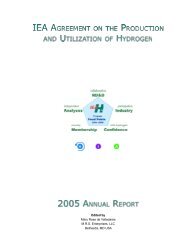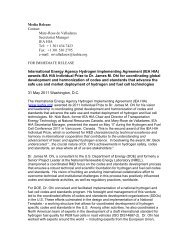Technology Status of Hydrogen Road Vehicles
Technology Status of Hydrogen Road Vehicles
Technology Status of Hydrogen Road Vehicles
Create successful ePaper yourself
Turn your PDF publications into a flip-book with our unique Google optimized e-Paper software.
temperature sensor, and more....In spite <strong>of</strong> higher figures advanced by the automotive industry, the cost <strong>of</strong><br />
pollution control equipment on gasoline vehicles, and the consequent price reduction for hydrogen vehicles,<br />
probably would not exceed $300-400.<br />
Concerning maintenance cost <strong>of</strong> pollution control equipment, it seems reasonable to assume that the present<br />
value (10% discount rate) <strong>of</strong> foregone emission control maintenance costs would be at least $50, bringing the<br />
$300-400 just mentioned to $350-450.<br />
Concerning vehicle life, hydrogen shares with natural gas some <strong>of</strong> the properties that purportedly give the<br />
latter its life-extending benefits, so, given a gasoline vehicle life <strong>of</strong> 210 000 km, 193 000-240 000 km is<br />
assumed for hydrogen vehicles.<br />
The incremental initial cost <strong>of</strong> hydride storage is subject to many uncertainties, but a cost range <strong>of</strong> $1500-2400<br />
is assumed here for an advanced, mass-produced, complete hydride system...suitable for vehicular use.<br />
Concerning hydride life and salvage value, it is assumed that hydrides could have a very high salvage value<br />
at the end <strong>of</strong> the life <strong>of</strong> the vehicle - perhaps as much as 50% <strong>of</strong> the initial cost. - but only 15% is taken...<br />
Concerning incremental cost <strong>of</strong> LH 2 storage, there are few, recent estimates <strong>of</strong> the cost <strong>of</strong> mass-produced,<br />
advanced LH 2 tanks.....Using them however, it is assumed mass-produced, advanced, 80-100 l tanks, with fuel<br />
delivery and boil<strong>of</strong>f control would add $700-1700 to the price <strong>of</strong> the car..... In the absence <strong>of</strong> good data, it<br />
is assumed that Dewars would have a salvage value <strong>of</strong> 10-25% <strong>of</strong> their initial cost, at the end <strong>of</strong> the life <strong>of</strong> the<br />
vehicle.<br />
8.8 Vehicle maintenance, operating and other periodic costs<br />
...balancing various factors, it is assumed that yearly maintenance costs with respect to the gasoline vehicle<br />
base case would be 90-110% for the hydride vehicle and 90-105% for the LH 2 vehicle, and that hydrogen<br />
vehicles would have 50-90% <strong>of</strong> the yearly engine oil replacement cost <strong>of</strong> gasoline vehicles.<br />
In the cost program, the life <strong>of</strong> the tires on the hydride vehicle is equal to baseline tire life for the gasoline<br />
vehicle divided by the ratio <strong>of</strong> the weight <strong>of</strong> the hydride vehicle to the weight <strong>of</strong> the baseline gasoline vehicle.<br />
...the baseline gasoline vehicle registration cost...is multiplied by the ratio <strong>of</strong> the initial cost <strong>of</strong> the hydrogen<br />
vehicle to the initial cost <strong>of</strong> the gasoline vehicle.<br />
...it is assumed in the low-cost scenario that insurance payments would be the same as for the gasoline<br />
vehicle,.....but....that insurance payments would be about 8% higher for LH 2 and 12% for hydride vehicles in<br />
the high-cost case.<br />
Finally, fuel lost to boil<strong>of</strong>f must be treated as an economic loss. In the low-cost case, it is assumed that the<br />
vehicle is driven frequently enough to prevent any boil<strong>of</strong>f, and in the upper-bound case.....would be 10% <strong>of</strong><br />
the fuel.<br />
8.9 External costs <strong>of</strong> hydrogen vehicles<br />
The use <strong>of</strong> hydrogen from coal, and to a much lesser extent solar hydrogen, imposes several kinds <strong>of</strong> costs on<br />
society which are not borne by those who pay for the vehicle and the fuel.<br />
.......<br />
The analysis is based on a 1987 DeLuchi report as updated to 1989.<br />
For the gasoline vehicle base case, the external cost consists primarily <strong>of</strong> air pollution damages and the<br />
macroeconomic costs <strong>of</strong> importing oil; it does not include the “costs” <strong>of</strong> a Greenhouse warming or <strong>of</strong> military<br />
51



